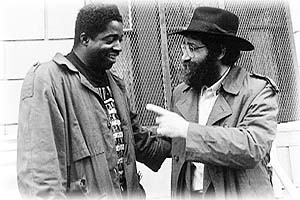![[Metroactive Movies]](/movies/gifs/movies468.gif)
![[Metroactive Movies]](/movies/gifs/movies468.gif)
[ Movies Index | Metro | Metroactive Central | Archives ]
Jewish Film Festival
 Double Vision: Blacks and Jews explores the relationship between the two minorities. Ten features and documentaries about the Jewish experience to be screened July 27 to 31 in Palo Alto The Hebrew word Makpela means "double." The vicious fraternal struggle in Israel between the Moslems--sons of Abraham and Hagar--and the Jews--sons of Abraham and Sarah--is mirrored in the lives of American Jews. They're assimilated and not quite assimilated. The 1997 Jewish Film Festival has the usual concerns of a small community-identified film festival. Thus, the 10 films offered July 27-31 at Palo Alto's Spangenberg Theater focus on Jewish identity, and the story of how the mysteries of the past have shaped the present. The festival includes features, documentaries and shorts. In one case, Judaism is a cultural background for very 20th-century case of pharmaceutical poisoning. A Healthy Baby Girl (July 28; 8:45pm) is Judith Helfand's own story of her bout with cancer caused by the prescription of a fertility drug to her mother. The drug was a synthetic estrogen called DES. A Healthy Baby Girl provides a capsule history of this dangerous hormone, used in food and as "fetal salvage" for miscarriage-prone mothers (despite evidence that it was worthless in this capacity). Helfand charts her pain and the sorrow of her support group of DES survivors. But really the topic is Judith's relationship with her mother and father, who support their daughter's sometimes needling video documentary, tolerating their daughter's refusal to just bury the pain and go on with life. Blacks and Jews (July 28; 6:30pm) is the highlight of the festival, a deep, smart, highly recommended documentary about the troubled relationships between these two groups in 1997. The current debacle is illuminated by several incidents: the Crown Heights riots in New York City in 1991, during which poverty-stricken Hassidic Jews and black Caribbean immigrants fought in the streets; the white flight in 1969 that turned Chicago's Lawndale from a leafy suburban neighborhood into an angry ghetto; and the much-reported incident in 1994 in which teenagers from Oakland's Castlemont High School on a field trip guffawed at a screening of Schindler's List. With intelligence and a remarkable lack of sensationalism and prejudice, filmmakers Alan Snitow and Deborah Kaufman bring up images that say it all--Jewish temples that have been changed into Baptist churches. One of the most telling moments is an excerpted performance piece by John O'Neal and Naomi Newman titled "Crossing the Broken Bridge," which boils down the current rift between blacks and Jews. O'Neal, playing an anti-Semitic black man, asks, "When are you going to stop whining about the Holocaust?" The Jewish woman answers, "When are you going to stop whining about slavery?" It's a hopeful film; hearing the students' side of the Schindler's List incident is a consolation if you assumed--as the editors of local newspapers were quick to assume--that the incident was proof of how desensitized today's young people are. My other favorite piece at the festival is the pithy French documentary The Abraham File (July 29; 6:30pm), which charts the conflict between Arabs and Israeli to historical roots that grow more vague the more they're analyzed. Most of the documentary is set at Hebron, an Arab town now unwillingly hosting Israeli settlers. And Hebron is also the location where Abraham is supposed to be buried. The French documentarian Abraham Segal, searching for the history of his namesake, interviews everyone from local people to academics to find out about the origin of the story of Abraham and his two sons. Segal discovers, as one scholar puts it, "whether he [Abraham] existed or not is secondary." Nothing is certain about the patriarch, not even his burial place. Abraham's place in lore as the father of three monotheistic religions is made by the "Akedah," as the Jews call it--namely, God's demand to Abraham that he kill his son, a story that's inspired artists ranging from Rembrandt to Nicholas Ray (in Bigger Than Life). In Zionist and Palestinian thought, the Akedah is not only a major source of religious faith but of religious doubt--and a symbol of those willing to kill and be killed for God. A more individual, if less informative, documentary look at the Holy Land is Chronicle of a Disappearance (July 29; 9pm). Elia Suleiman takes his camera to visit the discontented: a priest bitching about tourists at the Sea of Galilee; a cranky proprietor at souvenir stands selling relics of the Holy Land to modern-day pilgrims. It's a hard film to love. Suleiman has the smarts to capture telling images (his parents dozing through the sign-off of Israeli television) but not the wit to let them go. He reminds me of a dog I once had, who was a great retriever but not much of a relinquisher. Other films include the Argentinean import Autumn Sun (July 31; 9pm), starring Norma Aleandro, who gained international notice in the film The Official Story. Greta Ferusic/Survival in Sarajevo (July 31; 6:30pm) is a pair of documentaries about the troubles there. Ferusic was the first female grad from the University of Sarajevo and the dean of the school of architecture there. When the hostilities began in 1992, Ferusic refused to leave. Her story is billed with a documentary about the Jewish community's response to the war. A Life Apart (July 30; 6:30pm), is a documentary about the Hassids, the most traditional of all Jews. Mendel (July 27; 1:30pm) is the semiautobiographical account of a Jewish refugee family that comes to live in Norway after WWII.
The Jewish Film Festival runs July 27-31 at the Spangenberg Theater, 780 Arastradero Road, Palo Alto. Call 415/621-0556 for ticket information. [ Metro | Metroactive Central | Archives ]
| ||||||||||||||||||||||||||||||
Copyright © Metro Publishing Inc. Maintained by Boulevards New Media.